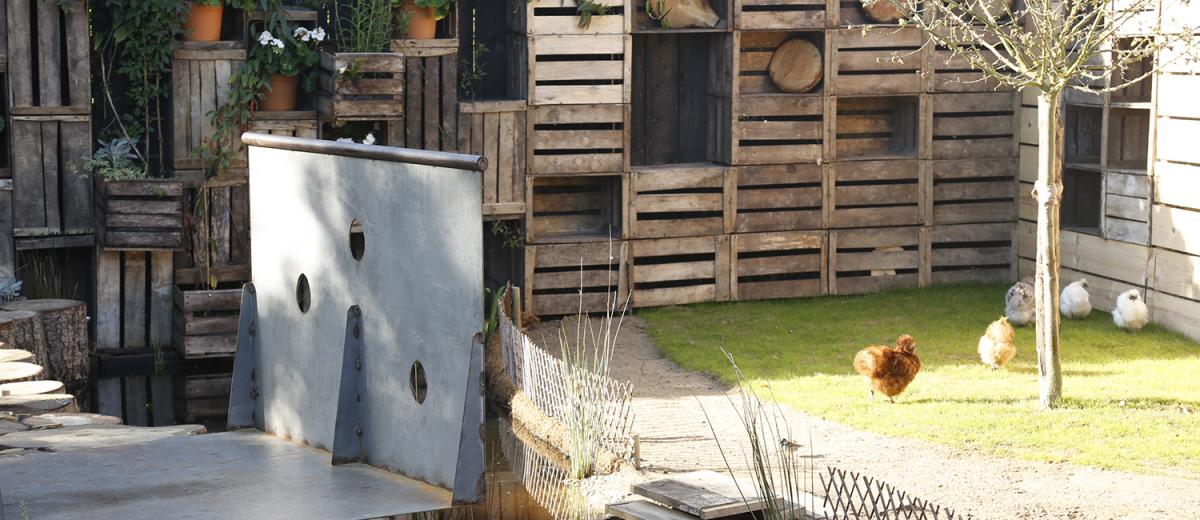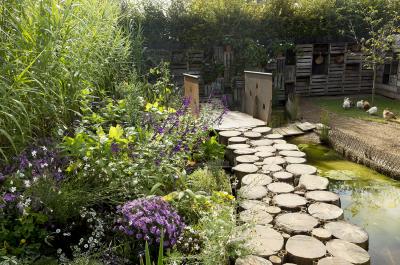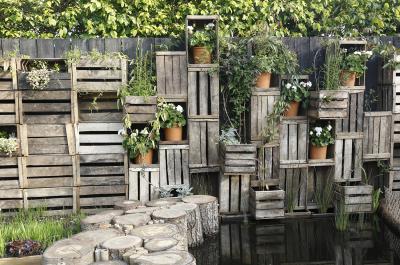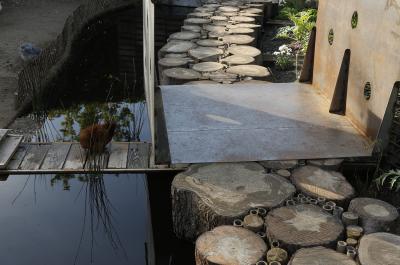Here, hens represent humans, and humans take themselves to be divinities. Hens live in the garden created by the divinities. They live on deadly sins. They waste everything, steal everything, destroy everything. They live on cold water and on providential crops, when all the while Eden is close at hand – Eden, with its values of respect, reason, and intelligence.
By entering the garden, we can proudly take the place of the divinities. To our right, we can look upon the hens that represent us, and that live with no moderation. To our left lies the kitchen garden that provides them with food in abundance. In that way, we look upon those birds that draw near to Eden without ever managing to reach it, and that sneak recklessly through the kitchen garden. We can also take the path made of wooden logs, to draw near and to look more closely upon the evocation of human thoughtlessness.
designers
Félix DUBUS, gardener and Jean DUBUS, architect
François GENOUVRIER, Slim BEN LASSUED, Samuel ROBINNE, architects, Frederic CHEVERRY, gardener and Alexandre CHAPUS, graphic designer and carpenter
FRANCE
From left to right: Jean Dubus, François Genouvrier, Samuel Robinne, Slim Ben Lassoued, Félix Dubus, Frédéric Cheverry and Alexandre Chapus
Jean Dubus
"An architect for the last forty years, I have enjoyed travelling the world, touching everything, undertaking projects and building palaces and houses for people. Public procurement was the central theme - it enabled the young designer that I was to get my foot in the door and to progress extremely quickly. I have always taken a step back from my works, on purpose, considering them as being intrinsically more importance than me. This is how I met people like me, and how I created a family and communities in Paris, Cuba, Phnom Penh and Nairobi, around ambitious projects, regardless of their scale. In the early 2000s, a feeling for landscape made its way into my research. My projects have gradually deconstructed the city to settle make a bed for themselves in nature and lie down in the grass. A simple poetic dimension which could have escaped me in favour of an overly-rigid discourse inherited from the modern movement. Brazil suddenly became obvious, while it had previously been a mere destination of intuition. I am building one of my latest buildings in Brasília. "Landscaping" quickly turned out to be conceptually similar to a political stance, in the way that it is simply a flat base which professionals have faced great difficulty in positioning upright, and which requires more looking after than an infant. Garden design, like literature, architecture, and music, is an entirely separate artistic discipline which pushes its own history into the background. As such, it fascinates me. My five children are artists. One of them, Felix, is a gardener, and one fine day we decided to exchange our time - one week with him in the gardens and one week with me under the cranes. From this rare and enriching exchange the idea of Chaumont was born, a wise combination of generations and talents".
Félix Dubus left Paris, first for Provence, then for Touraine. He studied Horticulture, then Landscape and immersed himself in the art of living in the French countryside, over the course of years of work and encounters in fields and gardens. Since 2006, he has been working as a gardener in private gardens where he shares his know-how, making individuals' gardens more interesting, embellishing and tending them throughout the seasons. He has a vision of the garden which combines culture, memory and new requirements of individuals with a view to bringing the -sometimes ephemeral - emotions and reflections which are born of these places, to life. Today, the desire to broaden his horizons has led him to share a new experience with his architect father - the Chaumont gardens project.
François Genouvrier
"The Chaumont-sur-Loire Garden Festival marks a return to the contemplation of rivers and to a dialogue with the landscape that I grew up in. Having grown up in Tours, my years spent studying architecture in Lille and Barcelona, then supervising projects in Paris, Limoges, Amiens and Brasília, opened up the field of possibilities. I entered into more and more exchanges; cultural dialogue became fertiliser for my personality. Over the years, a collective formed around the Jean Dubus Architecte firm. Astonishing and skilful projects can emerge from the balance of a team - "Le Jardin des poules" is a prime example of this.”
Samuel Robinne
"I feel emotional about being back at the Chaumont-sur-Loire Garden Festival. Indeed, in 2004 I exhibited a piece there as part of the design seminar which finished off my studies at the Ecole d’Architecture de Bretagne. Since then, I have taken part in many competitions and projects, both in France and abroad, as part of the firm Jean Dubus Architecte. "Le jardin des poules" is not a regular project in terms of scale and purpose. It is a delightful interlude which enables us, within a collective of close friends, to think outside the box while facing another challenge: to talk with the earth...And with the hens.”
Slim Ben Lassoued
"A native of the fertile plains of Sfax in Tunisia, I worked for various Parisian firms after finishing my architecture studies in Tunis. Four years ago, I joined a team of multidisciplinary designers that had formed around Jean Dubus. The elements that make up our plot, namely the field, the vegetable garden, the river and the animals, are for me the evocation of the family garden where I still take pleasure in recharging my batteries.”
35-year old Frédéric Cheverry was born and raised in Touraine in Azay sur Cher, not far from the Domaine de Chaumont-sur-Loire. During his childhood, he was given a family education oriented towards agriculture and livestock farming. At the age of 22, having studied Biology and the Agri-food trade at the Université François Rabelais de Tours, he went on to work in business with leading corporations. He became Félix Dubus' gardening student in 2012, with the desire on the one hand to receive instruction on the Art of Gardens, and on the other hand to go back to his roots.
Alexandre Chapus
"Since graduating from the École Nationale Supérieure des Arts Décoratifs de Paris in 2006, I have been working as a freelance graphic designer, as well as as an employee of the Loran Stosskopf studio up until 2012. I principally work on editorial productions (books, magazines, newspapers, brochures and communication materials) on visual identities and signage. I contributed to designing and implementing the visual identity and communication of Monumenta 2007 and 2010 at the Grand Palais, then, for another commission, to producing the draft of the Louvre museum (Grande Galerie) magazine. In 2011, I led the artistic direction of the special edition of Télérama on E. Munch. I am currently working on the design and implementation of the signage for the new emergency centre in Ivry-sur-Seine. Having been in Switzerland since 2012, I am working at the same time as a carpenter.”





